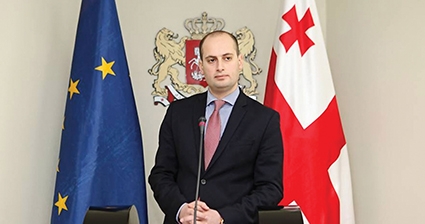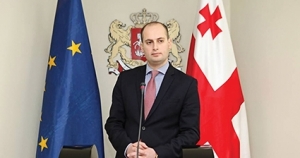Tragicomic? Georgian - Armenian Relations
OPED
Georgian politics has been rushing towards autumn at such pace that almost nobody has time for our foreign affairs policy. This could be the reason behind the fact that Georgian media did not pay enough attention to the recent visit of the Minister of Foreign Affairs Davit Janelidze to Yerevan. Quite unlike Armenian press who evaluated this visit, and Georgian-Armenian relations in general, as tragicomic. However, what exactly makes the relations between the two neighboring states tragic or comic has not been specified. Although this evaluation might be exaggerated, in light of the situation between our neighbors Turkey and Russia, who are almost at war, this evaluation needs more attention from Tbilisi. Especially with the MFA visiting Yerevan only after a meeting with the Turkish and Azerbaijani colleagues in Tbilisi.
It should be noted that the minister’s visit began quite unusually: despite the information about the bomb on the Yerevan-Moscow flight, he did not postpone his visit, instead driving to the capital to meet with President Serzh Sargsyan, Prime Minister Ovik Abraamyan and his counterpart Minister Edward Nalbandian. What message Janelidze brought from Tbilisi to Yerevan remains a secret. Neither Nalbandian nor Janelidze said anything about the goals and objectives of the visit at the press conference held after the meeting. And exactly this press conference was named tragicomic by Armenian journalists. The publication ‘First News’ wrote: “Although Janelidze and Nalbandian are talking about the centuries-long friendship between the two countries and about deepening relations, they do not say the reasons why the relations between these neighboring countries has not deepened thus far.”
In light of all this it really does seem quite comical that the Ambassador of Armenia to Georgia is not a diplomat by profession at all... and the Armenian media does nothing to hide this fact: “Armenia is in a blockade from the Turkish and Azerbaijani sides, therefore relations with Georgia as well as Iran have the foremost importance now... And in a country of such strategic significance Armenia has appointed an Ambassador, who, though part of our national sporting heritage, knows nothing about diplomacy...”
As for the other evaluations of the visit, these where connected more with linguistics than politics, which was probably the reason behind the evaluation of our relations as tragic.
“Yes, Armenians and Georgians have been living as neighbors for thousands of years, they are friends, but this is just words. In reality, we do not have any deep political relations, there are very few scientific studies in this field. Overall, Georgian studies are poorly developed in Armenia. Obviously, it is hard to even find an average translator who, if not able to translate the words of Georgian political figures, would at least not hinder the development of our mutual relations,” wrote First News after the press conference.
It should be noted that the translation during Mikheil Janelidze’s speech was really quite bad – with a strong Georgian accent and showing awful knowledge of Armenian, therefore leaving some parts open for interpretation by journalists.
How long the policy of dragging time in Georgian-Armenian relations will last is unknown. But after the relations between Ankara and Moscow have turned into an almost military tension, settling clear-cut relations between Tbilisi and Yerevan has acquired primary importance, especially in light of the news that the Russian Duma has started talking about rethinking the Karsi Agreement of 1921, according to which the modern borders of Georgia as well as Armenia are defined. Moscow has been extending this agreement every 25 years. Notably, this 25-year term expires exactly in 2016.
Zaza Jgarkava












